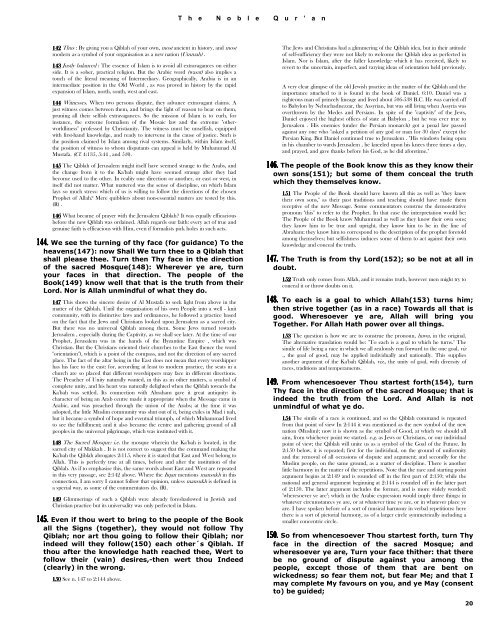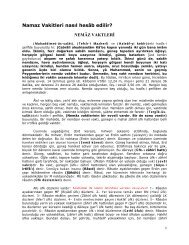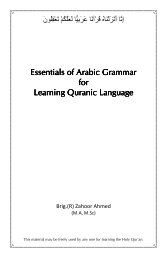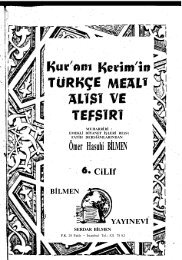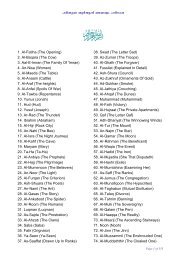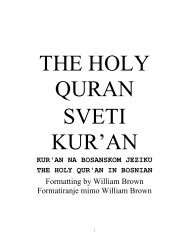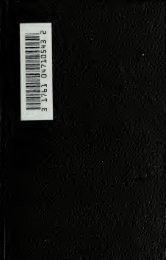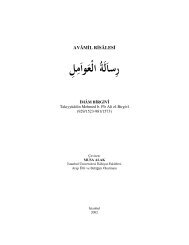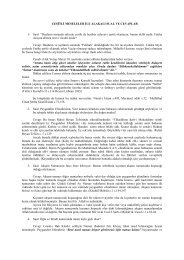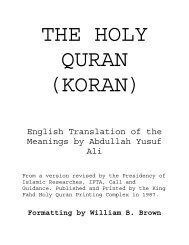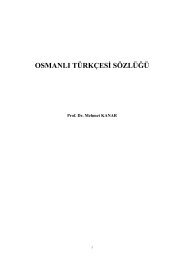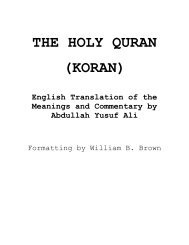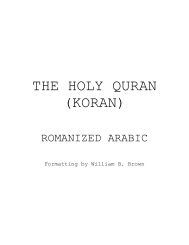English Quran with Commentaries By Yusuf-ali - HolyBooks.com
English Quran with Commentaries By Yusuf-ali - HolyBooks.com
English Quran with Commentaries By Yusuf-ali - HolyBooks.com
- No tags were found...
You also want an ePaper? Increase the reach of your titles
YUMPU automatically turns print PDFs into web optimized ePapers that Google loves.
T h e N o b l e Q u r ’ a n<br />
142 Thus : <strong>By</strong> giving you a Qiblah of your own, most ancient in history, and most<br />
modern as a symbol of your organisation as a new nation (Ummah) .<br />
143 Justly balanced : The essence of Islam is to avoid all extravagances on either<br />
side. It is a sober, practical religion. But the Arabic word (wasat) also implies a<br />
touch of the literal meaning of Intermediacy. Geographically, Arabia is in an<br />
intermediate position in the Old World , as was proved in history by the rapid<br />
expansion of Islam, north, south, west and east.<br />
144 Witnesses. When two persons dispute, they advance extravagant claims. A<br />
just witness <strong>com</strong>es between them, and brings the light of reason to bear on them,<br />
pruning all their selfish extravagances. So the mission of Islam is to curb, for<br />
instance, the extreme form<strong>ali</strong>sm of the Mosaic law and the extreme "otherworldliness"<br />
professed by Christianity. The witness must be unselfish, equipped<br />
<strong>with</strong> first-hand knowledge, and ready to intervene in the cause of justice. Such is<br />
the position claimed by Islam among rival systems. Similarly, <strong>with</strong>in Islam itself,<br />
the position of witness to whom disputants can appeal is held by Muhammad Al<br />
Mustafa. (Cf. 4:135, 5:44 , and 5:8).<br />
145 The Qiblah of Jerusalem might itself have seemed strange to the Arabs, and<br />
the change from it to the Ka'bah might have seemed strange after they had<br />
be<strong>com</strong>e used to the other. In re<strong>ali</strong>ty one direction or another, or east or west, in<br />
itself did not matter. What mattered was the sense of discipline, on which Islam<br />
lays so much stress: which of us is willing to follow the directions of the chosen<br />
Prophet of Allah? Mere quibblers about non-essential matters are tested by this.<br />
(R) .<br />
146 What became of prayer <strong>with</strong> the Jerusalem Qiblah? It was equally efficacious<br />
before the new Qiblah was ordained. Allah regards our faith: every act of true and<br />
genuine faith is efficacious <strong>with</strong> Him, even if form<strong>ali</strong>sts pick holes in such acts.<br />
144. We see the turning of thy face (for guidance) To the<br />
heavens(147): now Shall We turn thee to a Qiblah that<br />
shall please thee. Turn then Thy face in the direction<br />
of the sacred Mosque(148): Wherever ye are, turn<br />
your faces in that direction. The people of the<br />
Book(149) know well that that is the truth from their<br />
Lord. Nor is Allah unmindful of what they do.<br />
147 This shows the sincere desire of Al Mustafa to seek light from above in the<br />
matter of the Qiblah. Until the organisation of his own People into a well - knit<br />
<strong>com</strong>munity, <strong>with</strong> its distinctive laws and ordinances, he followed a practice based<br />
on the fact that the Jews and Christians looked upon Jerusalem as a sacred city.<br />
But there was no universal Qiblah among them. Some Jews turned towards<br />
Jerusalem , especially during the Captivity, as we shall see later. At the time of our<br />
Prophet, Jerusalem was in the hands of the <strong>By</strong>zantine Empire , which was<br />
Christian. But the Christians oriented their churches to the East (hence the word<br />
"orientation"), which is a point of the <strong>com</strong>pass, and not the direction of any sacred<br />
place. The fact of the altar being in the East does not mean that every worshipper<br />
has his face to the east: for, according at least to modern practice, the seats in a<br />
church are so placed that different worshippers may face in different directions.<br />
The Preacher of Unity naturally wanted, in this as in other matters, a symbol of<br />
<strong>com</strong>plete unity, and his heart was naturally delighted when the Qiblah towards the<br />
Ka'bah was settled. Its connection <strong>with</strong> Abraham gave it great antiquity: its<br />
character of being an Arab centre made it appropriate when the Message came in<br />
Arabic, and was preached through the union of the Arabs; at the time it was<br />
adopted, the little Muslim <strong>com</strong>munity was shut out of it, being exiles in Mad i nah,<br />
but it became a symbol of hope and eventual triumph, of which Muhammad lived<br />
to see the fulfillment; and it also became the centre and gathering ground of all<br />
peoples in the universal pilgrimage, which was instituted <strong>with</strong> it.<br />
148 The Sacred Mosque: i.e. the mosque wherein the Ka'bah is located, in the<br />
sacred city of Makkah . It is not correct to suggest that the <strong>com</strong>mand making the<br />
Ka'bah the Qiblah abrogates 2:115, where it is stated that East and West belong to<br />
Allah. This is perfectly true at all times, before and after the institution of the<br />
Qiblah. As if to emphasise this, the same words about East and West are repeated<br />
in this very passage, see 2:142 above. Where the Itqan mentions mansukh in this<br />
connection, I am sorry I cannot follow that opinion, unless mansukh is defined in<br />
a special way, as some of the <strong>com</strong>mentators do. (R).<br />
149 Glimmerings of such a Qiblah were already foreshadowed in Jewish and<br />
Christian practice but its univers<strong>ali</strong>ty was only perfected in Islam.<br />
145. Even if thou wert to bring to the people of the Book<br />
all the Signs (together), they would not follow Thy<br />
Qiblah; nor art thou going to follow their Qiblah; nor<br />
indeed will they follow(150) each other´s Qiblah. If<br />
thou after the knowledge hath reached thee, Wert to<br />
follow their (vain) desires,-then wert thou Indeed<br />
(clearly) in the wrong.<br />
150 See n. 147 to 2:144 above.<br />
The Jews and Christians had a glimmering of the Qiblah idea, but in their attitude<br />
of self-sufficiency they were not likely to wel<strong>com</strong>e the Qiblah idea as perfected in<br />
Islam. Nor is Islam, after the fuller knowledge which it has received, likely to<br />
revert to the uncertain, imperfect, and varying ideas of orientation held previously.<br />
A very clear glimpse of the old Jewish practice in the matter of the Qiblah and the<br />
importance attached to it is found in the book of Daniel. 6:10. Daniel was a<br />
righteous man of princely lineage and lived about 506-538 B.C. He was carried off<br />
to Babylon by Nebuchadnezzar, the Assyrian, but was still living when Assyria was<br />
overthrown by the Medes and Persians. In spite of the "captivity" of the Jews,<br />
Daniel enjoyed the highest offices of state at Babylon , but he was ever true to<br />
Jerusalem . His enemies (under the Persian monarch) got a penal law passed<br />
against any one who "asked a petition of any god or man for 30 days" except the<br />
Persian King. But Daniel continued true to Jerusalem . "His windows being open<br />
in his chamber to wards Jerusalem , he kneeled upon his knees three times a day,<br />
and prayed, and gave thanks before his God, as he did aforetime."<br />
146. The people of the Book know this as they know their<br />
own sons(151); but some of them conceal the truth<br />
which they themselves know.<br />
151 The People of the Book should have known all this as well as "they knew<br />
their own sons," as their past traditions and teaching should have made them<br />
receptive of the new Message. Some <strong>com</strong>mentators construe the demonstrative<br />
pronoun "this" to refer to the Prophet. In that case the interpretation would be:<br />
The People of the Book know Muhammad as well as they know their own sons;<br />
they know him to be true and upright, they know him to be in the line of<br />
Abraham: they know him to correspond to the description of the prophet foretold<br />
among themselves; but selfishness induces some of them to act against their own<br />
knowledge and conceal the truth.<br />
147. The Truth is from thy Lord(152); so be not at all in<br />
doubt.<br />
152 Truth only <strong>com</strong>es from Allah, and it remains truth, however men might try to<br />
conceal it or throw doubts on it.<br />
148. To each is a goal to which Allah(153) turns him;<br />
then strive together (as in a race) Towards all that is<br />
good. Wheresoever ye are, Allah will bring you<br />
Together. For Allah Hath power over all things.<br />
153 The question is how we are to construe the pronoun, huwa, in the original.<br />
The alternative translation would be: "To each is a goal to which he turns." The<br />
simile of life being a race in which we all zealously run forward to the one goal, viz<br />
., the goal of good, may be applied individually and nationally. This supplies<br />
another argument of the Ka'bah Qiblah, viz., the unity of goal, <strong>with</strong> diversity of<br />
races, traditions and temperaments.<br />
149. From whencesoever Thou startest forth(154), turn<br />
Thy face in the direction of the sacred Mosque; that is<br />
indeed the truth from the Lord. And Allah is not<br />
unmindful of what ye do.<br />
154 The simile of a race is continued, and so the Qiblah <strong>com</strong>mand is repeated<br />
from that point of view In 2:144 it was mentioned as the new symbol of the new<br />
nation (Muslim); now it is shown as the symbol of Good, at which we should all<br />
aim, from whichever point we started. e.g. as Jews or Christians, or our individual<br />
point of view; the Qiblah will unite us as a symbol of the Goal of the Future. In<br />
2:150 below, it is repeated; first for the individual, on the ground of uniformity<br />
and the removal of all occasions of dispute and argument; and secondly for the<br />
Muslim people, on the same ground, as a matter of discipline. There is another<br />
little harmony in the matter of the repetitions. Note that the race and starting point<br />
argument begins at 2:149 and is rounded off in the first part of 2:150; while the<br />
national and general argument beginning at 2:144 is rounded off in the latter part<br />
of 2:150. The latter argument includes the former, and is more widely worded:<br />
"wheresoever ye are"; which in the Arabic expression would imply three things: in<br />
whatever circumstances ye are, or at whatever time ye are, or in whatever place ye<br />
are. I have spoken before of a sort of musical harmony in verbal repetitions: here<br />
there is a sort of pictorial harmony, as of a larger circle symmetrically including a<br />
smaller concentric circle.<br />
150. So from whencesoever Thou startest forth, turn Thy<br />
face in the direction of the sacred Mosque; and<br />
wheresoever ye are, Turn your face thither: that there<br />
be no ground of dispute against you among the<br />
people, except those of them that are bent on<br />
wickedness; so fear them not, but fear Me; and that I<br />
may <strong>com</strong>plete My favours on you, and ye May (consent<br />
to) be guided;<br />
20


